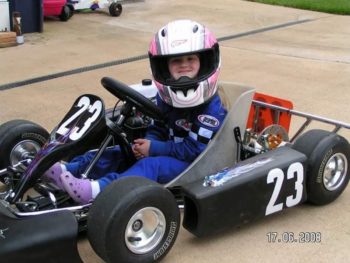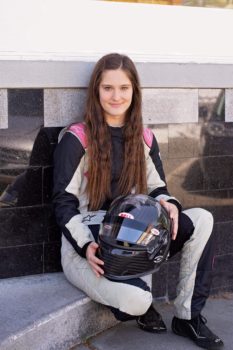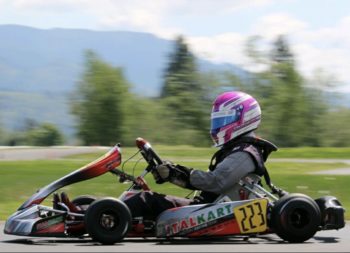
Ellie Musgrave found her calling when she was 4 years old. Her father took her to the racetrack and a dream sparked. She surprised her dad by saying, “I want to do that.”
Much like the electrical charge that brings a car to life, the draw to racing happened in an instant and throttled her into motion. It was in the sound of engines, the whooshing of the cars as they sped by on the track.
That’s when she knew she wanted to be a race car driver.
“I knew I wanted to be behind the wheel,” said Ellie.
When she was 4 years old, her father bought her a Dora the Explorer electric quad. She loved it and excelled, so her dad searched and found a kid’s go-kart. She practiced in her driveway until she was allowed to race legally at 5 years old. She whizzed around the local karting club track at Evergreen Speedway, sporting a white and pink helmet, her tiny frame controlling the movement of the kart from behind the wheel. She was a natural, and quickly found herself on podiums, medals dangling from her neck and trophies proudly displayed in her room.
An unexpected speed bump
Ellie loved the speed and heart-thrumming adrenaline she experienced when she raced. As she grew up, her vehicles and ambitions grew, as well. After competing nationally in go-cart racing for more than 9 years, she moved up. At 14 years old, she raced her first car. She was full speed ahead, until she hit an unexpected bump in the road and her dream was derailed. Just two years into the stock car racing scene she came to notice a difference in her health.
The symptoms started with dizziness. She was preparing for racing season when she noticed her vision blacking out at the corners, like light collapsing in a tunnel. At first, she thought she was just pushing it too hard or standing up too fast.
Then one day, she was racing when the symptoms suddenly overwhelmed her. The dizziness and disorientation made her feel like she was driving blind. She spun out and came into the pits, nearly hitting someone on the way in. She barely made it out of the car when she collapsed. Her dad caught her, and they left the track.
Doctors ordered an MRI to make sure there was nothing nefarious causing the unusual dizziness. She had the scan, and her family came home to wait for the results. A couple hours later, the phone rang.
“You need to go to Seattle Children’s emergency room right away,” said the voice on the other end of the phone line.
Ellie’s mother walked into her room.
“We’re going to the hospital,” she said. “They found something.”
It was a whirlwind.
“It didn’t hit me right away,” said Ellie. “I didn’t understand what was going on.”
Ellie’s father, mother and younger sister packed into their car and headed to Seattle Children’s. In the silence, her mother began to cry. Then they all started to cry.
“When your loved ones are crying, it sort of hits you,” she said. “They found a mass on my brain.”
A quick pit stop
When they arrived at the Emergency Department, Ellie was quickly admitted. A team of doctors immediately converged to make a plan to remove the tumor. She arrived on a Friday, and by Monday morning she was being prepped for surgery.
“I can’t say enough about Seattle Children’s,” said Ellie. “They saved my life. The doctors are amazing. Everyone was treating me like one of their family members. I knew I was in good hands.”
For Ellie and her family, the diagnosis was a lot to process. She went from a teenager with aspirations of being a race car driver to a patient at Seattle Children’s getting wheeled into a surgery suite to have a large tumor in the back of her brain removed.
“I remember there were a lot of things going through my mind,” explained Ellie. “I wanted to tell my loved ones I love them. At the time, I didn’t know if I was going to make it.”
Thankfully, the tumor was benign and Dr. Samuel Browd, a neurosurgeon at Seattle Children’s, and his team were able to fully remove the tumor.
Since the tumor was fully removed, Ellie was cured without the need for radiation or chemotherapy.
“There are tumors where neurosurgery is the cure. We have a great and collegial approach with Oncology, and they are our partners in evaluating and treating these kids and are the backbone of their long-term care and follow-up.”
Dr. Nick Vitanza was brought in very quickly to care for Ellie as well. He is a pediatric neuro-oncologist at Seattle Children’s and also directs the Vitanza Lab at Seattle Children’s Research Institute’s Ben Towne Center for Childhood Cancer Research. He says her outcome has been remarkable.
“Thankfully, the chances of recurrence are low,” Dr. Vitanza explained.
“This is why we do neurosurgery,” Dr. Browd added. “To cure kids of otherwise deadly or life-altering diseases.”

A world-class team
Seattle Children’s Brain Tumor Program brings together a coordinated, multidisciplinary care team from many specialties, including neurology and oncology. Dr. Vitanza uses a football analogy to describe how the teams work together.
“We get to kind of quarterback a big team of people who are involved in the care of children and teenagers with brain tumors,” he said. “What inspires me is the ability to bring all the right people together to manage their care. Streamlining and simplifying these services for families is really rewarding.”
Dr. Vitanza said Ellie’s story is really a neurosurgical success story. “If my child needed brain surgery, Seattle Children’s is the only place I would come,” he noted.
After surgery, Ellie recovered quickly. Within a week she walked out of the hospital. Three months later, she was back on the track, racing again toward her dream.
For teenagers like Ellie, Dr. Vitanza said it’s important for them to feel supported after going through such a jarring medical ordeal.
“You go from having headaches to needing to have a brain tumor taken out,” he said. “It is emotionally and psychologically devastating. I think she’s handled it incredibly well. Honestly, when I see her in clinic, I usually walk in the door and I say, ‘Just to start with, your MRI looks good.’ Then I make sure she’s getting the support she needs.”
Ellie said that approach to care is a breath of fresh air.
“I couldn’t ask for someone better,” Ellie explained. “He really cares. He even asks about my racing.”
Dr. Vitanza said it can often be more difficult for teenagers to emotionally recover from such a diagnosis.
“As a teenager, you think about how life was before cancer,” he explained. “Some can’t keep up in school because they get headaches. Others have trouble sleeping. They can also get flashbacks from going into surgery or the beeping of the ICU machines.”
Services like neuropsychology and social work are vital to the care Seattle Children’s provides to help this patient population.
“It’s been a journey, but I’m happy and I’m healthy,” Ellie said. “I think about Seattle Children’s a lot. It’s a place dear to my heart.”

Back to work
Today, Ellie is 18 years old, and she has her sights on the national racing series. She currently races at Evergreen Speedway in the mini stock class. She looks up to NASCAR driver Kyle Larson. She also wants to be able to give back to Seattle Children’s in some way.
“I love kids, and I want to make a difference.”
Ellie still has follow-up appointments every six months, but she’s not looking in the rearview mirror. She’s excited to be moving forward.
“Life is precious,” she said. “You never know when you’re going to take your last breath. Live your life and remind your loved ones that you love them.”
Dr. Vitanza said Ellie’s future is bright.
“Our goal is to make sure that children get to stay the children they want to be, and that they get the chance to turn into the adults they want to be. I think Ellie is a great example of that,” he said.
“And I want her to have a good helmet,” he added, laughing.

